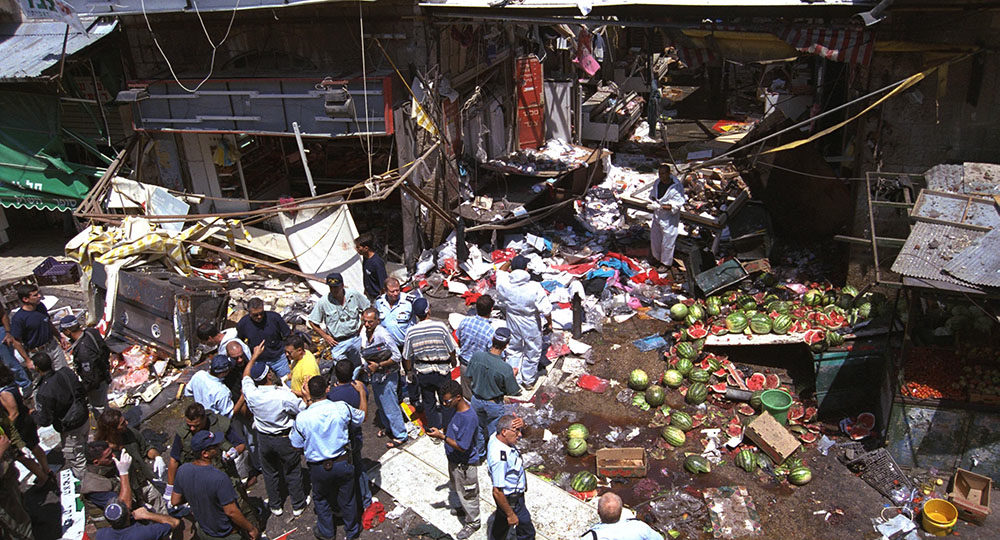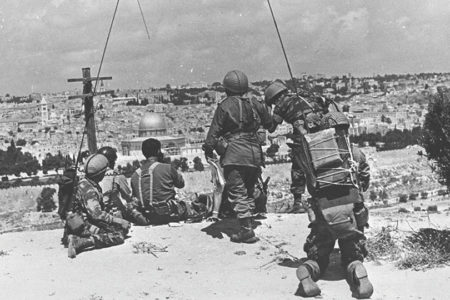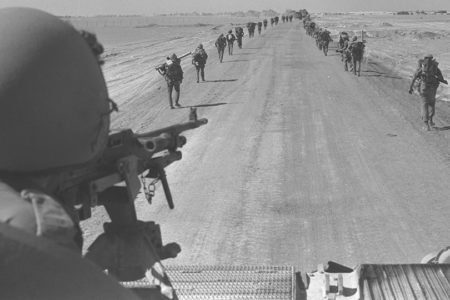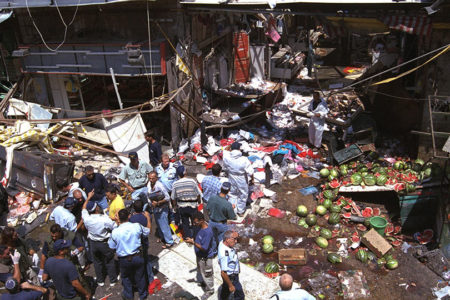Bombs in the Marketplace: “How Long, Oh Lord?”
On July 30, two young Arab men embarked on a suicide mission with the intent to kill and maim more innocent Israelis. Their target was Jerusalem’s Mahane Yehuda market, an open-air shopping strip jammed tightly between buildings in what looks somewhat like a wide alley. The place is perpetually crowded with people who come to pick the best of the fresh fruits and vegetables for their tables. It is the market where, for years, Zvi’s wife Naomi has gone every day of the week to do her shopping. At about 1:15 that afternoon, when the market was especially busy, the two men got out of a car and walked casually into the market. Each carried a briefcase, and they quickly stationed themselves within sight of one another, among people more intent on selecting vegetables than eyeing their executioners.
When the bombers, within seconds of one another, threw the toggle switches that set off their devices, shoppers’ bodies were torn by screws and nails placed in the devices to increase the damage to be done. By the time rescuers arrived at the scene, they found nearly two hundred people on the ground, buried under fruit, vegetables, and debris from the stalls that had collapsed from the force of the blast. When a count was taken, there were 15 dead, including the two bombers, and 168 wounded. Once again Jerusalemites were chilled by the all-too-familiar sounds of ambulance sirens screaming in the City of Peace.
“City of Peace” does not seem to fit the profile of modern Jerusalem. Ironically, the period of the peace process in which Israelis and Palestinians have engaged has only accelerated the death and mayhem Jews have come to expect from their misnamed “peace partners.” As a matter of fact, some Israelis, not without good cause, say that what has transpired is more akin to a “war process” than a quest for peace. The body count appears to verify that assessment. Since the first suicide bombing occurred in October 1994, 259 Israelis and 4 Americans have been killed. More than 5,000 have been wounded in terrorist attacks during the same period. These figures represent the largest number of Israelis dead and injured from terrorist attacks in any comparable period since the State of Israel was born 50 years ago.
The Silence Is Deafening
After the October 1994 attack, Warren Christopher, then U.S. Secretary of State, was quoted to have said that the United States was declaring “war” on terrorism. He was correct in his assertion that there is indeed a war in progress. But, if what Israelis are threatened by daily is war, we have yet to witness any significant response from the counterterrorists in the Western world. There is, of course, an abundance of tough rhetoric. However, as long as there is no tangible reaction to their violence—that is, severe action that proves there is a heavy price to pay for killing innocent people—terrorism will not subside.
Not only do the perpetrators go unpunished, but it seems that whenever such attacks occur, Israel is blamed for inciting these madmen and admonished to give up more land and make concessions that no civilized nation should make when in a functional state of war. In the meantime, leaders of rogue states continue to train, arm, harbor, and send young Muslim fanatics to their death with virtual immunity. There simply is no international outrage. There is, on the contrary, silence in the corridors of the United Nations—a silence that is deafening.
A gauge of the sincerity level in the United Nations, when it relates to the nation of Israel, is a comparison between the reaction to Israel’s legitimate construction of a housing development—Har Homa—and the bombing at the Mahane Yehuda market in Jerusalem. It is a quick study because of the proximity of the events. A nettled Yasser Arafat, who demands veto power over every brick that Jews plan to lay in or around Jerusalem, was rewarded with a 131–3 United Nations vote to condemn the Israeli government for daring to stand by their decision to build. But when the bombs went off in Mahane Yehuda and charred bodies were carried out, there were virtually no condemnatory statements made in the United Nations. The families of the dead will no doubt wait in vain for the international “keepers of world peace” to register a 130-plus vote to condemn those who conspire to drive screws and nails into unsuspecting Jews out for an afternoon of shopping.
How Long, Oh Lord?
There is little new about the current state of indifference toward atrocities committed against Jewish people. An overwrought prophet, Jeremiah, uttered the classic lament in mourning the destruction of Jerusalem by the Babylonians.
“Is it nothing to you, all ye that pass by? Behold, and see if there be any sorrow like unto my sorrow, which is done unto me, with which the Lᴏʀᴅ hath afflicted me in the day of his fierce anger” (Lam. 1:12).
The captivity in Babylon was one of the low-water marks in the history of the Chosen People. Jeremiah and his companion prophets mourned for a city and a people who were forced to pass through the fire. But there is a word of hope and promise that is not found by a cursory examination of the inexpressibly terrible circumstances in which Israel and its people have been caught up over the centuries. It is given not by philosophers or the thought-to-be-wise of this world. In order to find this promise of hope, we must turn to the book of all books, the Bible. Ironically, in times of great stress Jewish people, as is true with Gentiles, often turn from the faith of the fathers and the Torah, rather than to them.
We are compelled to remember that Jeremiah, the prophets, and indeed the writers of the Psalms directed their laments and cries for explanations to the God who brought the nation and its people into existence. Not only did they receive answers for their frustrated minds, they were also given evidence that, in spite of how bad things appeared, He was with them.
Isaiah, in reference to the Babylonian exile, was told:
“When thou passest through the waters, I will be with thee; and through the rivers, they shall not overflow thee; when thou walkest through the fire, thou shalt not be burned, neither shall the flame kindle upon thee…Fear not; for I am with thee” (Isa. 43:2, 5a).
Surpassingly marvelous words, these, because they bear two tremendous affirmations. First, the nation will never be forsaken. Second, God guarantees its preservation by His own presence. The question, therefore, is never, “Where is God when we need Him?” Rather, it is, “Where are we in reference to Him and obedience to what He is attempting to teach us?”
The psalmist asked the question during a time of prolonged distress.
“How long wilt thou forget me, O Lᴏʀᴅ? Forever? How long wilt thou hide thy face from me? …How long shall mine enemy be exalted over me?” (Ps. 13:1, 2b).
Although he did not, in the context of the Psalm, receive an immediate answer, there was cause for hope and triumph to invade his soul.
“But,” he declared, “I have trusted in thy mercy; my heart shall rejoice in thy salvation. I will sing unto the Lᴏʀᴅ, because he hath dealt bountifully with me” (Ps. 13:5–6).
This, in the end, is the answer to every inexplicable dilemma we face. It has always been true of Israel. In Isaiah 43:1, where God promised His presence when His people were immersed in fire and flood, the word was, “I have redeemed thee.” In Psalm 13 He put it this way: “my heart shall rejoice in thy salvation.” Circumstances fluctuate with the times and seasons of life; personal peace never does—if it rests in the Lord and His promised Redeemer.
We who have found that peace in Jesus commend it, along with our fervent prayers, to all who are suffering through tribulation too great for the mind to grasp or our little strength to banish.








I was standing on the spot where the first bomber blew himself up only 20 seconds before. I can still see the images in my head to this day. But for the LORD’s hand I wouldn’t be here today.